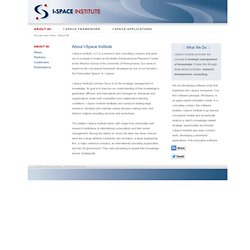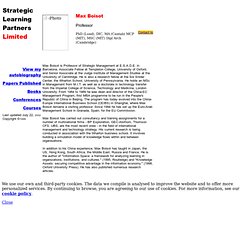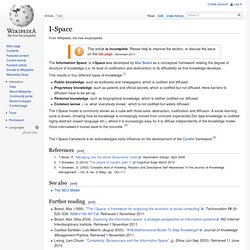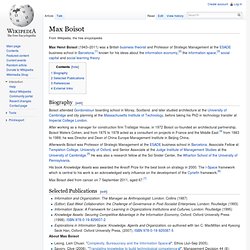

Www.scs-europe.net/conf/ecms2010/2010 accepted papers/abs_ECMS2010_0052.pdf. Www.gcph.co.uk/assets/0000/0900/Max_Boisot__summary_paper_final.pdf. Wep.wharton.upenn.edu/research/SimISpace3_200405.pdf. Baoman.files.wordpress.com/2009/12/max-boisot-the-case-of-the-atlas-experiment-at-cern-ickm-3-dec-2009.pdf. I-Space Institute, LLC. I-Space Institute, LLC is a research and consulting company that grew out of a research project at the Snider Entrepreneurial Research Center at the Wharton School of the University of Pennsylvania.

Our name is based on the conceptual framework developed by one of our founders - the "Information Space" or I-Space. I-Space Institute's primary focus is on the strategic management of knowledge. Its goal is to improve our understanding of how knowledge is generated, diffused, and internalized and managed by individuals and organizations under both competitive and collaborative learning conditions. I-Space Institute facilitates and conducts leading-edge research, develops and markets unique decision-making tools, and delivers original consulting services and workshops.
Professor Max Boisot. Max Boisot is Professor of Strategic Management at E.S.A.D.E. in Barcelona, Associate Fellow at Templeton College, University of Oxford, and Senior Associate at the Judge Institute of Management Studies at the University of Cambridge.

He is also a research fellow at the Sol Snider Center, the Wharton School, University of Pennsylvania. He holds an MSc in Management from M.I.T. as well as a doctorate in technology transfer from the Imperial College of Science, Technology and Medicine, London University. From 1984 to 1989 he was dean and director of the China-EC Management Program, first MBA programme to be run in the People's Republic of China in Beijing. The program has today evolved into the China-Europe International Business School (CEIBS) in Shanghai, where Max Boisot remains a visiting professor. Since 1994 he has set up the Euro-Arab Management School in Granada, Spain, for the EU Commission. I-Space. The Information Space, or I-Space was developed by Max Boisot as a conceptual framework relating the degree of structure of knowledge (i.e. its level of codification and abstraction) to its diffusibility as that knowledge develops.

This results in four different types of knowledge.[1] Public knowledge, such as textbooks and newspapers, which is codified and diffused.Proprietary knowledge, such as patents and official secrets, which is codified but not diffused. Here barriers to diffusion have to be set up.Personal knowledge, such as biographical knowledge, which is neither codified nor diffused.Common sense – i.e. what ‘everybody knows’, which is not codified but widely diffused. The I-Space model is commonly shown as a cube with three axes: abstraction, codification and diffusion.
The I-Space framework is an acknowledged early influence on the development of the Cynefin framework.[3] References[edit] See also[edit] The SECI Model Further reading[edit] Boisot, Max (1999). Max Boisot. Max Henri Boisot (1943–2011) was a British business theorist and Professor of Strategic Management at the ESADE business school in Barcelona.[1] known for his ideas about the information economy,[2] the information space,[3] social capital and social learning theory Biography[edit] Boisot attended Gordonstoun boarding school in Moray, Scotland. and later studied architecture at the University of Cambridge and city planning at the Massachusetts Institute of Technology, before taking his PhD in technology transfer at Imperial College London.

After working as a manager for construction firm Trafalgar House, in 1972 Boisot co-founded an architectural partnership, Boisot Waters Cohen, and from 1975 to 1978 acted as a consultant on projects in France and the Middle East.[4] from 1983 to 1989, he was Director and Dean of China Europe Management Institute in Beijing China. Afterwards Boisot was Professor of Strategic Management at the ESADE business school in Barcelona. Selected Publications[edit]